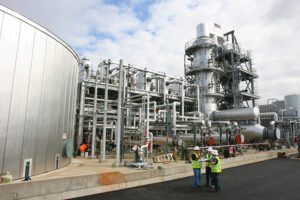Today, Clean Fuels Alliance America welcomed a bipartisan letter from 37 Representatives urging the Environmental Protection Agency “to increase blending targets for biomass-based diesel to levels that account for industry growth” as it finalizes the Renewable Fuel Standards for 2023, 2024 and 2025 by June. The letter emphasizes that the set rule is “an opportunity to facilitate further growth in this critical sector” but expresses concern “that the proposed RVOs for advanced biofuels, particularly biomass-based diesel, represent a step in the wrong direction.”
“Expansion and investments throughout the biomass-based diesel value chain have been vast over the past several years, in large part because of support from the federal government,” the Representatives write, noting increased investments through USDA’s Higher Blends Infrastructure Incentive Program and the Sustainable Aviation Fuel Grand Challenge.
EPA’s own data show that U.S. biodiesel and renewable diesel production increased by more than 500 million gallons in 2022. With industry investments, domestic renewable diesel capacity could more than double to 5.9 billion gallons by 2025, according to independent analyses by the University of Illinois and USDA’s Economic Research Service and the Energy Information Administration. The planned growth is supported by investments of nearly $5 billion by oilseed processors to increase availability of vegetable oils and meal for domestic use.
“The proposed RVOs do not acknowledge these investments on the ground, undercutting these expansions and unnecessarily putting them at risk — a potential blow to rural economies across the country.” the Representatives continue.
“The clean fuels industry thanks the bipartisan group of Congress members for prompting EPA to support industry growth and investment that are aimed at achieving the goals of the RFS,” stated Kurt Kovarik, Vice President of Federal Affairs with Clean Fuels. “The biodiesel and renewable diesel industry is meeting 5 percent of the nation’s demand for heavy-duty fuels and is helping keep consumer prices in check right now. Increased production and use of these advanced biofuels supports energy security, economic opportunities, and environmental benefits.”
“We especially thank Representatives Ashley Hinson of Iowa and Angie Craig of Minnesota for leading this letter,” Kovarik added.
In November 2022, Clean Fuels published a new study, “Economic Impact of Biodiesel on the U.S. Economy 2022,” conducted by LMC International. The study finds that based on 2021 market data, the biodiesel and renewable diesel industry produced 3.1 billion gallons and generated $23.2 billion in economic activity, while supporting 75,200 jobs paying $3.6 billion in annual wages in the United States. For every 100-million-gallon increase in domestic clean fuel production, the direct, indirect and induced economic activity increases by $1.09 billion and U.S. jobs grow by 3,185. The largest economic and employment benefits occurred in the farming, oilseed processing, and fuel production sectors.
The study further calculates that producing 6 billion gallons of clean fuels in the United States would increase overall economic activity from the current $23.2 billion to $61.6 billion and support 187,003 jobs earning $8.8 billion in wages. The construction of additional capacity would increase economic activity by an added $4.3 billion and support an additional 144,500 related temporary jobs earning $5.8 billion in wages.
Contact: Paul Winters, 202-737-8803, pwinters@cleanfuels.org.
ABOUT CLEAN FUELS ALLIANCE AMERICA
Made from an increasingly diverse mix of resources such as recycled cooking oil, soybean oil, and animal fats, the clean fuels industry is a proven, integral part of America’s clean energy future. Clean Fuels Alliance America is the U.S. trade association representing the entire biodiesel, renewable diesel and sustainable aviation fuel supply chain, including producers, feedstock suppliers and fuel distributors. Clean Fuels receives funding from a broad mix of private companies and associations, including the United Soybean Board and state checkoff organizations.





